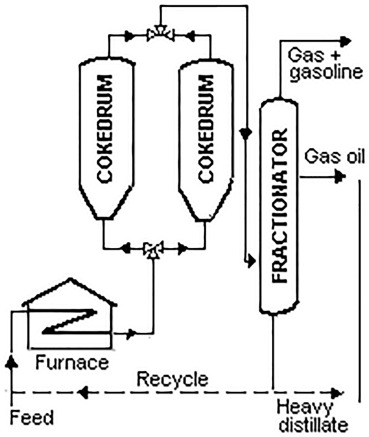Coking is a complex and critical process in the petroleum refining industry, involving the thermal decomposition of heavy hydrocarbon fractions into lighter products. This blog delves into the world of coking, exploring its principles, types, applications, challenges, and future directions.
What is Coking?
Coking is a refinery process that converts heavy, complex hydrocarbons (such as vacuum residue, asphalt, or petroleum coke) into lighter, more valuable products like gasoline, diesel, and jet fuel. This process involves heating the feedstock to high temperatures (typically between 900°F and 1,200°F) in the absence of air, causing the molecules to break down and recombine into more desirable compounds.
Types of Coking Processes
There are several types of coking processes, each with its unique characteristics and applications:
- Delayed Coking: This is the most common type of coking process, where the feedstock is heated in a furnace and then fed into a coking drum, where the coking reaction occurs.
- Fluid Coking: In this process, the feedstock is fed into a fluidized bed reactor, where it is heated and cracked into lighter products.
- Flex coking: This process combines delayed coking and fluid coking, offering greater flexibility and efficiency.
- Solvent DE asphalting (SDA): This process uses a solvent to extract the lighter fractions from the heavy feedstock, leaving behind a residue that can be further processed.
Applications of Coking
Coking plays a vital role in the petroleum refining industry, enabling the production of a range of valuable products, including:
- Gasoline: Coking helps to increase the yield of gasoline from heavy feedstocks.
- Diesel: Coking produces diesel fuel with improved cetane numbers and reduced sulfur content.
- Jet Fuel: Coking helps to produce jet fuel with improved thermal stability and reduced sulfur content.
- Petrochemicals: Coking produces lighter olefins and aromatics, which are used as feedstocks for petrochemical production.
Challenges in Coking
While coking is a crucial process, it also poses several challenges:
- Coke Formation: The formation of coke, a solid carbonaceous residue, can lead to equipment fouling, reduced efficiency, and increased maintenance costs.
- Feedstock Quality: The quality of the feedstock can significantly impact the coking process, with impurities like metals and sulfur compounds affecting catalyst performance and product quality.
- Energy Consumption: Coking is an energy-intensive process, requiring significant amounts of fuel and electricity to heat the feedstock and operate the equipment.
- Environmental Concerns: Coking can generate harmful emissions, including sulfur dioxide, nitrogen oxides, and particulate matter, which must be carefully managed to minimize environmental impact.
Opportunities in Coking
Despite the challenges, coking offers several opportunities for improvement and innovation:
- Advances in Catalyst Technology: New catalysts and catalyst systems can improve coking efficiency, reduce coke formation, and enhance product quality.
- Process Intensification: New process designs and equipment can improve coking efficiency, reduce energy consumption, and increase productivity.
- Feedstock Diversification: The use of alternative feedstocks, such as biomass or waste materials, can reduce reliance on traditional fossil fuels and minimize environmental impact.
- Digitalization and Automation: The application of digital technologies, such as advanced process control and predictive analytics, can optimize coking operations, reduce downtime, and improve product quality.
Conclusion
Coking is a complex and critical process in the petroleum refining industry, offering opportunities for innovation and improvement. By understanding the principles, challenges, and opportunities in coking, refineries can optimize their operations, improve product quality, and reduce environmental impact. As the industry continues to evolve, it is likely that coking will play an increasingly important role in the production of fuels and petrochemicals.

